The best athletes in the world all start at the beginning. To be
good, great or the best, there are no shortcuts. Regardless of your
goal—to be the world’s best or to start training with a new tool as a
way to introduce something fresh to your program—the key is to start
with the basics. That means learning and mastering the basics skills
before focusing on how much, how long or how fast.
In an ACE-sponsored study,
researchers from the University of Wisconsin-La Crosse concluded that,
in addition to the predicted strength gains, kettlebell training
improved core strength and dynamic balance, and increased aerobic
capacity. With such a diverse increase in specific exercise markers,
it’s no wonder kettlebell training continues to grow in popularity.
Regardless of where you want to be in three, six or 18 months, using
kettlebells can be a great way to help you reach your goals. Like most
training tools, using the correct technique is critical. Take the time
to perfect your technique before progressing to the more advanced moves.
Many of the advanced movements in kettlebells build on the basics
swings and catches. As you become more proficient, the basics moves can
become part of your warm-up routine to prepare you for the more complex
movements. Don’t let the need to use a heavy starting weight get in the
way of your technique. If your goal is to use the heaviest kettlebell
out there, don’t worry—it’s waiting for you. Perfect your technique
first. Remember—practice makes permanent, and perfect practice makes
perfection.
This program should be completed after running through a warm-up,
paying particular attention to ensuring the glutes, hips, torso and
shoulders are warm. Rather than focusing on reps, a different approach
is to complete a few reps, stop, rest and repeat. As you become more
comfortable, add a few more reps. Set yourself a time range in which you
want to work. It is more important to complete the reps while using
good form than it is to check the box for a certain number of reps. When
starting out, take 20 to 30 seconds to complete a set and then rest for
30 seconds. Spend no more than five minutes on each exercise.
Kettlebell Deadlifts
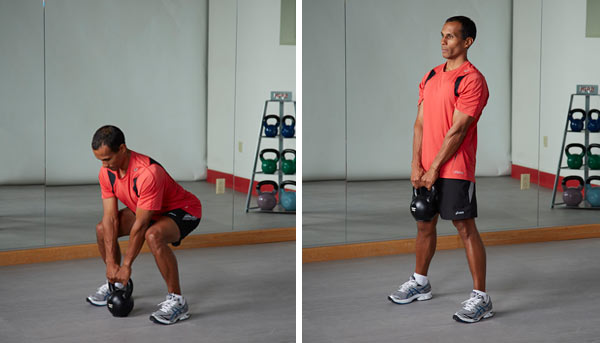
This is a great exercise to start warming up the body.
Set up: Stand with the feet shoulder-width apart, toes slightly out.
Keep the chest up and the back straight. Bend at the hip and slightly at
the knees to lower and grip a kettlebell with both hands.
Follow up: While keeping the weight on your heels, drive the hips
open to a standing position. Brace the core and squeeze the glutes.
Kettlebell Two-arm Swing
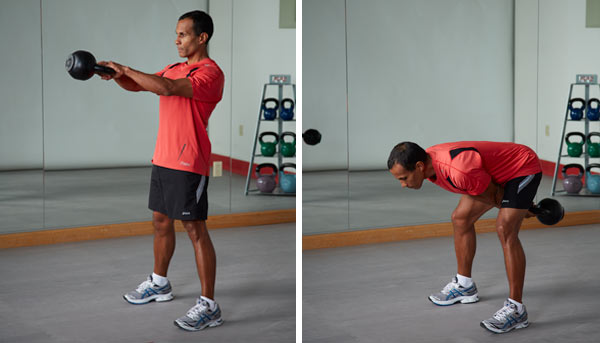
This exercise is a foundational movement. Once you master this
exercise, you can proficiently move to other movements such as the
single-arm swing, snatches and cleans.
Set up: Start with a kettlebell on the floor, centered in front of
your feet. Assume a deadlift position. Grasp the kettlebell and extend
and hike/pull the kettlebell up and back through your legs. As the
kettlebell reaches the end of its arc, use an explosive sharp movement
and extend your knees and hips.
Follow up: Contract the glutes as you extend the hips, and keep the
biceps close to the rib cage. The kettlebell should travel up to
approximately mid chest height.
Kettle Single-arm Swing
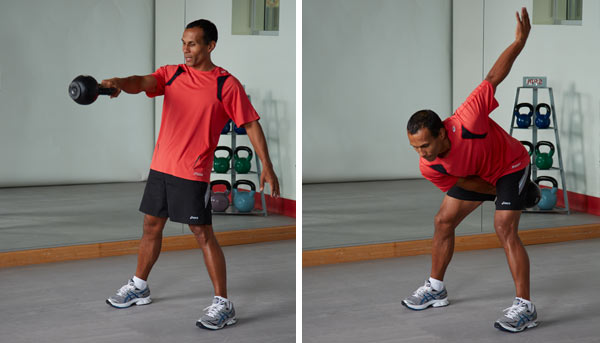
This movement starts to challenge the core because you not only need
to control the kettlebell as it swings through its arc, but the rotation
as well.
Set up: Start with a kettlebell on the floor, centered in front of
your feet. Assume a deadlift position. Grasp the kettlebell with one
hand and extend and hike/pull the kettlebell up and back through your
legs. As the kettlebell reaches the end of its arc, use an explosive
sharp movement and extend your knees and hips. The kettlebell should
travel up to approximately mid chest height. (Tip: Turn the thumb of the
hand holding the kettlebell toward the glutes as you swing back and
then twist (supinate the forearm) toward the front as you swing the
kettlebell forwards.) Complete the desired number of repetitions and
then switch sides.
Follow up: Keep the grip arm straight and strong through the arc.
Goblet Squat
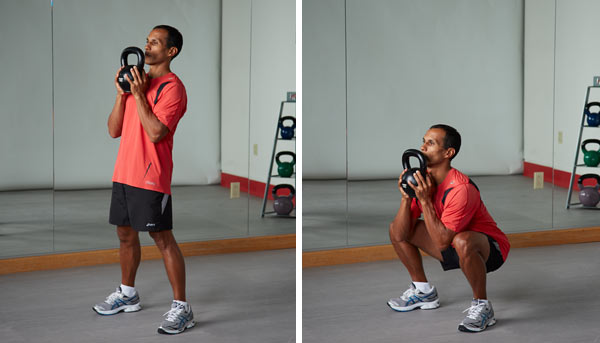
This exercise is just one of a few different ways to perform a squat using kettlebells.
Set up: Hold a kettlebell with both hands at chest height. Stand with
the feet shoulder-width apart, toes slightly out; keep the chest up and
back straight.
Follow up: Bend at the hips and knees and push the hips back. Keep
the elbows forward as you sit back down into a squat. Keep the weight on
the heels as you drive the hips back up to a standing position.
Lunge
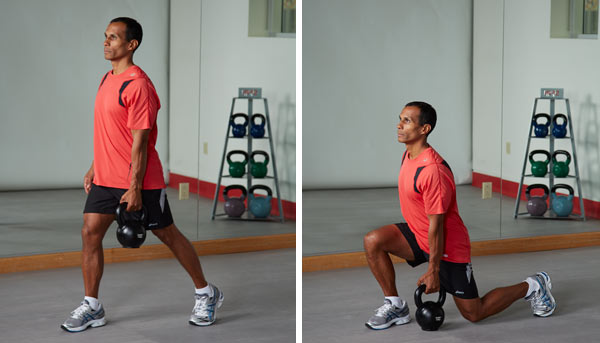
This exercise can be also performed with a kettlebell in both hands or with a single kettlebell extended over the head.
Set up: Stand comfortably and hold a kettlebell in the right hand. Step forward into a lunge with the left foot.
Follow up: While keeping the chest lifted and the shoulders pressed
back, push through the forward leg back to the standing position.
Complete the desired number of repetitions on one leg and then switch
sides.
Source : Anthony Wall, MS / ACE

No comments:
Post a Comment